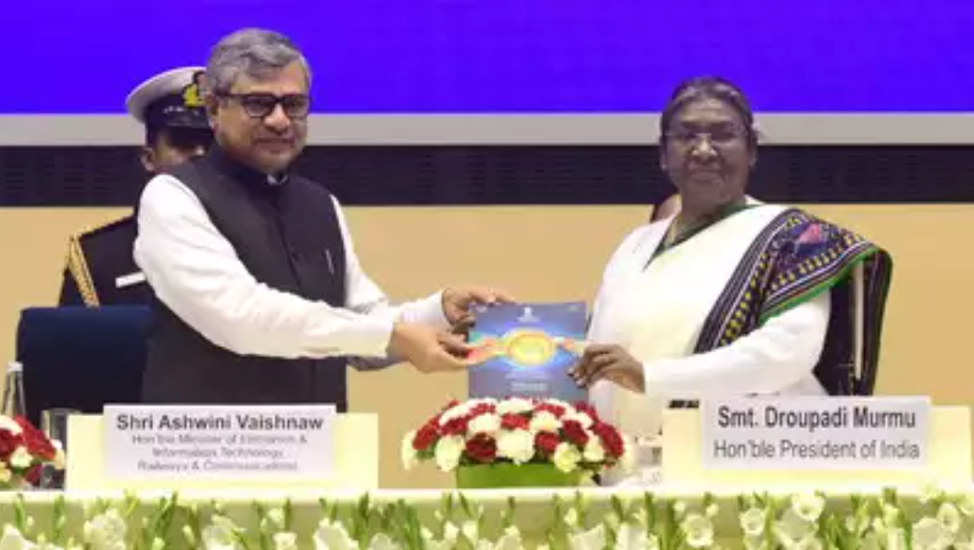
by Editor | Jan 9, 2023 | Global Alliance for Digital Governance
After proving its poweress in the field of software, India should strive to become a hub for software products, President Droupadi Murmu said on Saturday.
While speaking at the 7th edition of Digital India Awards, Murmu said that there should focus on democratising government data to help technology enthusiasts in the country develop localised digital solutions.
“We should leverage the prevailing policies and avail the ecosystem to position the country as a global powerhouse of software and hardware products by building made in India technology,” Murmu said.
She said India has emerged as an important country for use of technology for people-centric governance, especially during the pandemic, which has benefitted the rest of the world as well.
“Digital India is also playing an important role in enhancing the country’s profile on the world stage. This becomes all the more relevant as India takes over the presidency of G20 which is a milestone event,” Murmu said.
India formally assumed the G20 Presidency on December 1, 2022.
The Global Alliance for Digital Governance (GADG) considers India as a vital pillar for peace and security together with the US, EU, and Japan. With “AIWS Actions to create an Age of Global Enlightenment,” in 2023 BGF will organize a high-level meeting of BGF leaders, contributors, and leaders of partners, alliances of BGF with government, congress, and big tech, big companies, top universities of India to discuss about Global Enlightenment Economy models, Global Enlightenment Education.
https://www.outlookindia.com/business/india-should-strive-to-become-hub-of-software-products-focus-on-democratising-government-data-president-droupadi-murmu-news-251641
https://timesofindia.indiatimes.com/india/india-should-strive-to-become-hub-of-software-products-focus-on-democratising-govt-data-president-murmu/articleshow/96811986.cms


by Editor | Jan 1, 2023 | News
BGF chose this image as a symbol of the Global Enlightenment Age.
MIT Professor Nazli Choucri, BGF Board Member, wrote:
Three Critical Imperatives for the Age of Global Enlightenment
- Sustainability in framing and implementation of vision – while taking on responsibilities for fundamental remediation
- Precautionary Principle: — consider consequences of each actions, feedback logic, impacts on whole mission and vision.
- Power of Political Participation – people matter and matter a lot; individually and collectively – even the very best of ideas need support of the many.

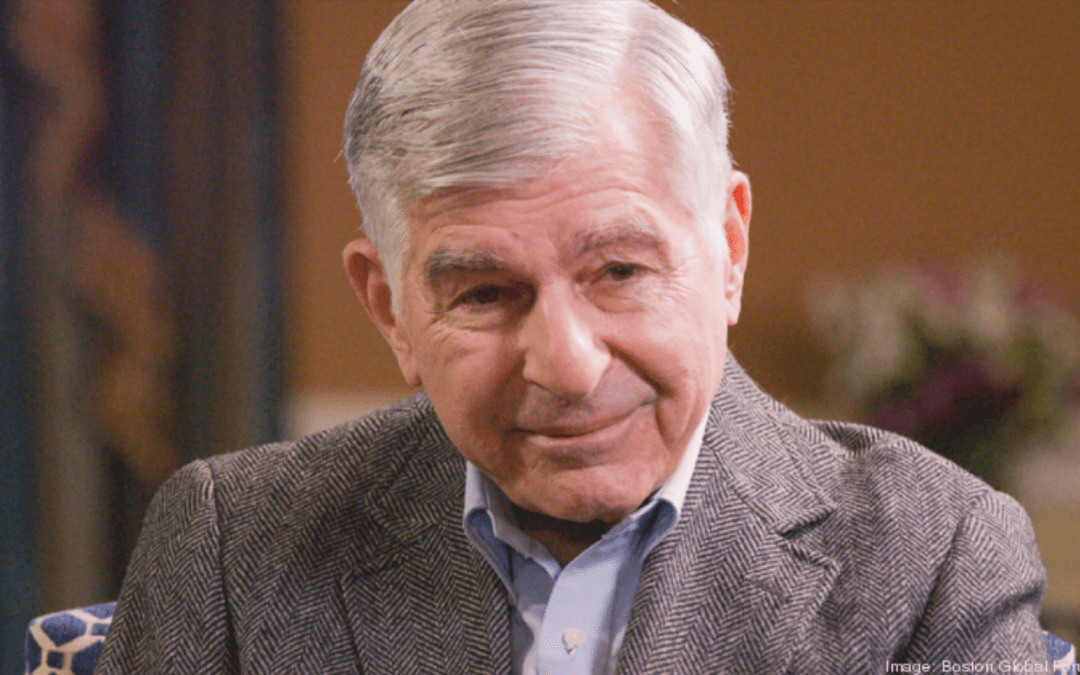
by Editor | Jan 1, 2023 | Global Alliance for Digital Governance
By Michael Dukakis, Nguyen Anh Tuan, Alex Pentland
Dec 30, 2022
Artificial intelligence (AI) and automated systems are increasingly affecting our daily lives. Banking algorithms decide who is eligible for housing or loans, healthcare algorithms are making decisions on coverage and standards of care. Companies are using hiring algorithms to sort resumes. While all of these innovations make life more convenient, they pose risks to the public and are often rife with bias and discrimination.
In October, the White House Office of Science and Technology Policy (OSTP) released a “Blueprint for an AI Bill of Rights.” As leaders of the Boston Global Forum, we applaud President Biden and the OSTP for advancing this important measure, which protects people from threats and defines guardrails on technology to reinforce civil rights, civil liberties and privacy, and equal opportunities ensuring access to critical resources and services.
The blueprint outlines common-sense protections with respect to AI:
- It shouldn’t discriminate;
- It shouldn’t violate data privacy;
- We should know when AI is being used;
- We should be able to opt out and talk to a human when we encounter a problem.
It’s not binding legislation, but rather a set of recommendations for government agencies and technology companies using AI. It’s also a great tool to educate the public as well as organizations responsible for protecting and advancing our civil rights and civil liberties.
On the world stage, bad actors in other nations are increasingly using AI to spread disinformation and propaganda through deep fakes and other manipulated media.
Last year, the Boston Global Forum and World Leadership Alliance — Club de Madrid brought prominent international leaders together to explore ideas and strategies and for a Global Law and Accord on Artificial Intelligence and Digital Rights.
The group established the Global Alliance for Digital Governance (GADG) to coordinate resources among governments, international organizations, corporations, think tanks, civil society and influencers for AI and a digital sphere for good, to make the resources more effective to synthesize and maximize their impact. It is not an organization, but rather, a network for sharing resources and cooperating among governments. At the core of this initiative is to establish a common understanding of policy and practice, anchored in general principles to help maximize the “good” and minimize the “bad” associated with AI:
- Fairness and justice for all: The first principle is already agreed upon in the international community as a powerful aspiration. All entities – private and public – should treat, and be treated, with fairness and justice.
- Responsibility and accountability for policy and decision making — private and public: The second principle recognizes the power of the new global ecology that will increasingly span all entities worldwide—private and public, developing and developed.
- Precautionary principle for innovations and applications: The third principle is to support innovation. It does not push for regulation but supports initiatives to explore the unknown with care and caution.
- Ethics-in-AI: Fourth is the principle of ethical integrity. At issue is incorporating the cultural commonalities into a global ethical system for all phases, innovations, and manifestations of artificial intelligence.
Without adequate guidelines and useful directives, the undisciplined use of AI poses risks to the wellbeing of individuals and creates fertile ground for economic, political, social, and criminal exploitation. As we gain consensus on principles and practices among members of the global society, we will generate and enhance social benefits and well-being for all, shared by all.
Michael Dukakis is the former governor of Massachusetts and chairman of the Boston Global Forum. Nguyen Anh Tuan is CEO of the Boston Global Forum. MIT Professor Alex “Sandy” Pentland is a contributor to the book “Remaking the World – Toward an Age of Global Enlightenment” and a board member of the UN global partnership for sustainable development data.
https://www.bizjournals.com/boston/news/2022/12/30/dukakis-tuan-pentland-an-ai-bill-of-rights-must.html

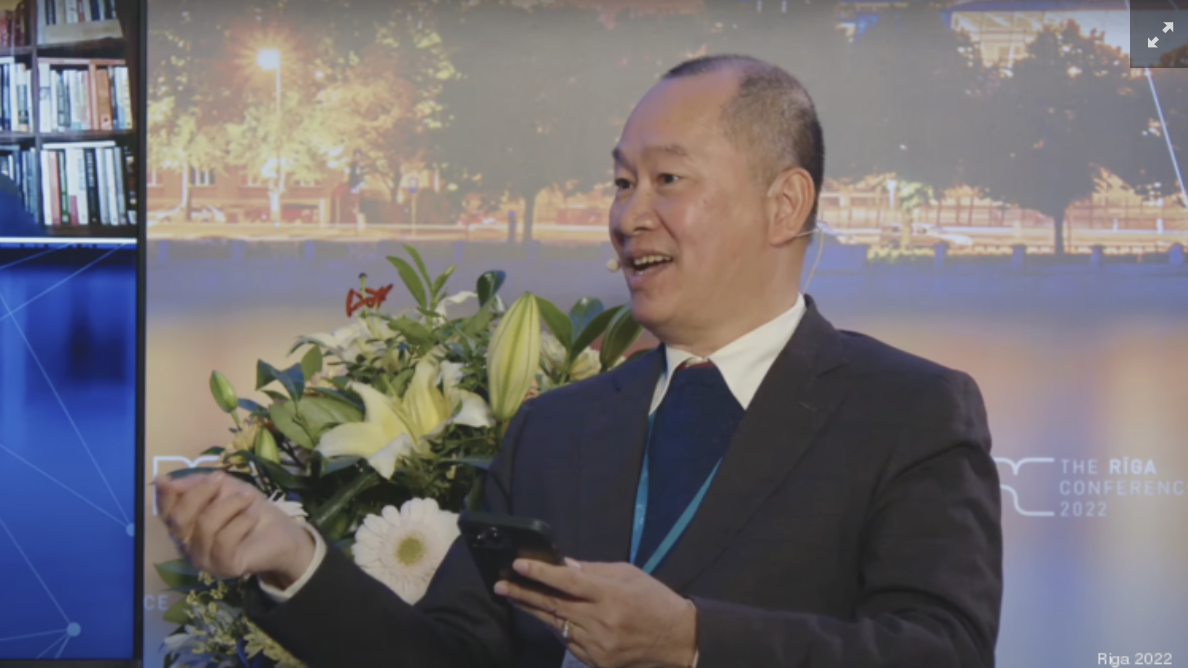
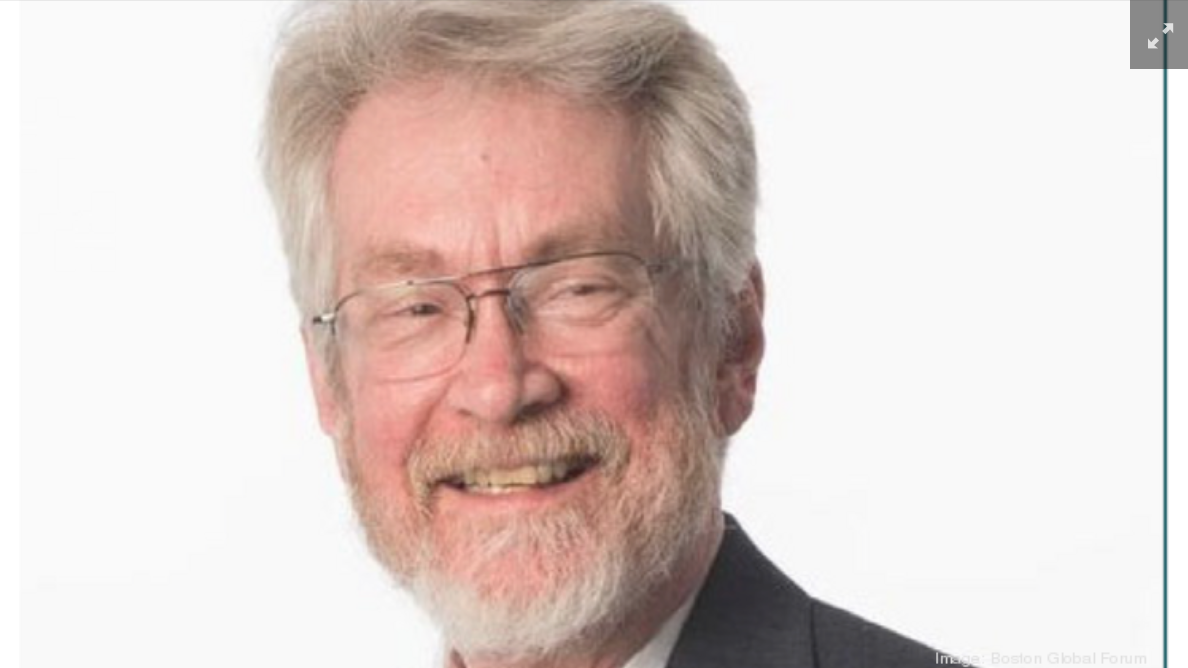
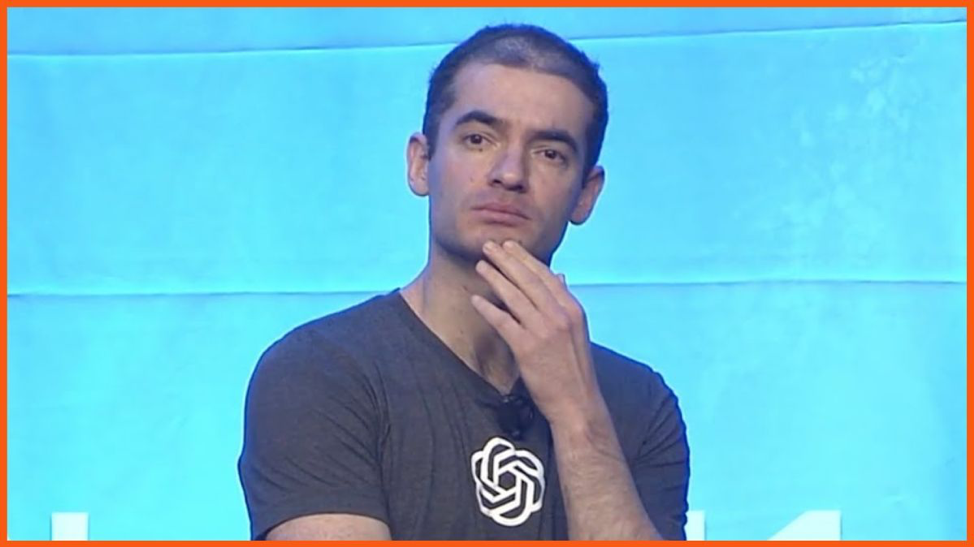
by Editor | Jan 1, 2023 | Event Updates, News
BOSTON – The AI World Society announced the History of AI 2022 Awards. The HAI Awards recognize people and achievements in the AI world that are pioneering, meaningful, and influential.
The History of AI 2022 Awards for Achievement go to:
OpenAI – Dall*E 2 and ChatGPT
OpenAI is selected for the HAI 2022 Award due to the organization’s work in DALL-E 2 and ChatGPT.
OpenAI is an AI research lab, with a mission statement of “promoting and developing friendly AI in a way that benefits humanity as a whole.” The project was founded in 2015 by individuals and groups such as Sam Altman, Elon Musk, AWS, and Y Combinator, who invested over $1 billion into the venture.
DALL-E 2 is a deep learning model that generates images and drawings through user prompts. ChatGPT is an AI chatbot that was launched in late November 2022. Users can ask questions or prompts, and ChatGPT could respond in kind, similar to what a human would answer.
There are concerns with DALL-E 2, and other AI art generators broadly, on copyright infringements. As these models study works done by artists, many see it as not being fairly compensated for their efforts. On the other program, ChatGPT’s flaws include some issues with answers to questions, with some accuracy. Some also have fears about it in education, that students may be able to spoof actual writing with whatever ChatGPT spit out.
Policies that could potentially combat these issues in OpenAI’s programs include oversight or guidance to be beneficial to mankind, moving them away from sensitive or social-manipulating arenas. To this end, it should be ensured that DALL-E and ChatGPT would follow BGF guidelines and the fundamental rights and ethics.
Manifesto “AIWS Actions to create an Age of Global Enlightenment” and
Distinguished Global Enlightenment Speech of Amandeep Gill – Global Digital Compact
The first Distinguished Global Enlightenment Speech was delivered by Amandeep Gill, UN Under-Secretary General, Envoy on Technology, at the ceremony at Harvard University Loeb House on November 22, 2022 to honor him with the World Leader in AIWS Award 2022.
Manifesto “AIWS Actions to create an Age of Global Enlightenment” was announced and discussed at the ceremony, with its cores being:
Artificial Intelligence World Society (AIWS) aims to bring scientists, academics, government officials and industry leaders together to keep AI a benign force serving humanity’s best interests and contributing to the realization of the hopes of Pope Francis and that of the United Nations Secretary-General Antonio Guterres who has proposed a “Global Digital Compact, based on shared principles for an open, free and secure digital future. We look forward also to an Age of Global Enlightenment where every person can be an innovator and opportunities are created for all individuals, businesses, and organizations to support a Global Enlightenment Education Program (GEEP) and a Global Enlightenment Economy Infrastructure (GEEI) and build a home of creativity for themselves.
Global Enlightenment Economy with its focus not only on material and financial values, but contributing to the Age of Global Enlightenment with peace, security, prosperity for every country and every people while preventing extreme nationalism in any country. This would inform the Global Enlightenment Polity where all individuals can participate in policy deliberations, introduce new ideas and contribute in all ways to collective global wellbeing. GEEI would also challenge misinformation and disinformation, fulfilling a United Nations vision of digital trust and security. The Manifesto will seek, in particular, to contribute to the preparations for and deliberations at the United Nations “Summit of the Future” called by Secretary-General Guterres for September 2024.
The History of AI 2020 Awards to Individuals go to:
OpenAI co-founder and chief scientist Ilya Sutskeever
He has made several major contributions to the field of deep learning. He is the co-inventor, with Alex Krizhevsky and Geoffrey Hinton, of AlexNet, a convolutional neural network. Sutskever is also one of the many authors of the AlphaGo paper.
The History of AI 2022 Awards will be featured at the AI World Society City. The AI World Society (AIWS) City, established in collaboration with the World Leadership Alliance – Club de Madrid, and the United Nations Academic Impact, is a practical model for the Age of Global Enlightenment.
Contacts:
Tuan Nguyen, CEO of the Boston Global Forum:
Email: [email protected]
Phone: 617 286 6589
Jim McManus:
Email: [email protected]
Phone: 617-413-9232

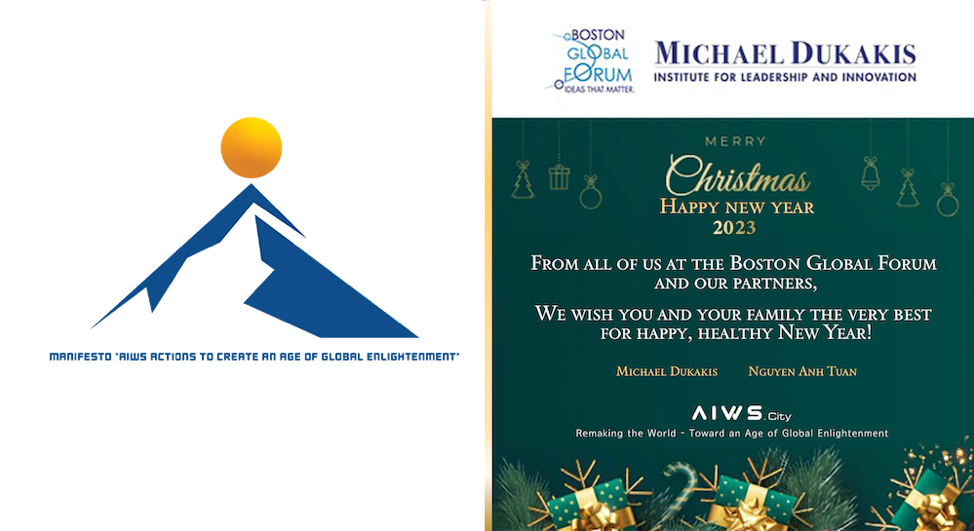
by Editor | Jan 1, 2023 | News
Boston, 1/1/2023
Dear Friends,
As we close in on the old year and look forward to the new, the gratitude of all of us at the Boston Global Forum for the support of your actions and ideas over 2022 and all good wishes for 2023, which is a year of special meaning for us as it will allow us to celebrate Governor Dukakis’s ninetieth birthday.
But we do have ten months before that time to continue the many activities of our hearts and our minds which are the best tribute to his lifetime of imagination and service.
We will continue our work on an Artificial Intelligence World Society (AIWS) project which aims to bring scientists, academics, government officials and industry leaders together to keep AI a benign force serving humanity’s best interests and contributing to the realization of the hopes of Pope Francis and that of the United Nations Secretary-General Antonio Guterres who has proposed a “Global Digital Compact, based on shared principles for an open, free and secure digital future. We look forward also to an Age of Global Enlightenment where every person can be an innovator and opportunities are created for all individuals, businesses, and organizations to support a Global Enlightenment Education Program (GEEP) and a Global Enlightenment Economy Infrastructure (GEEI) and build a home of creativity for themselves.
Linked to this would be a Global Alliance for Digital Governance and the Global Enlightenment Economy with its focus not only on material and financial values, but contributing to the Age of Global Enlightenment with peace, security, prosperity for every country and every people while preventing extreme nationalism in any country. This would inform the Global Enlightenment Polity where all individuals can participate in policy deliberations, introduce new ideas and contribute in all ways to collective global wellbeing. GEEI would also challenge misinformation and disinformation, fulfilling a United Nations vision of digital trust and security. Our work will seek, in particular, to contribute to the preparations for and deliberations at the United Nations “Summit of the Future” called by Secretary-General Guterres for September 2024
I attach the full text of our “manifesto” which some of you have already seen and which outlines our plans and possibilities in greater detail. We look forward to your support and your ideas which have always enriched our work and, in that process, our contributions to the world to which we are blessed to belong.
Happy new year 2023!
Nguyen Anh Tuan
Co-founder and CEO of Boston Global Forum

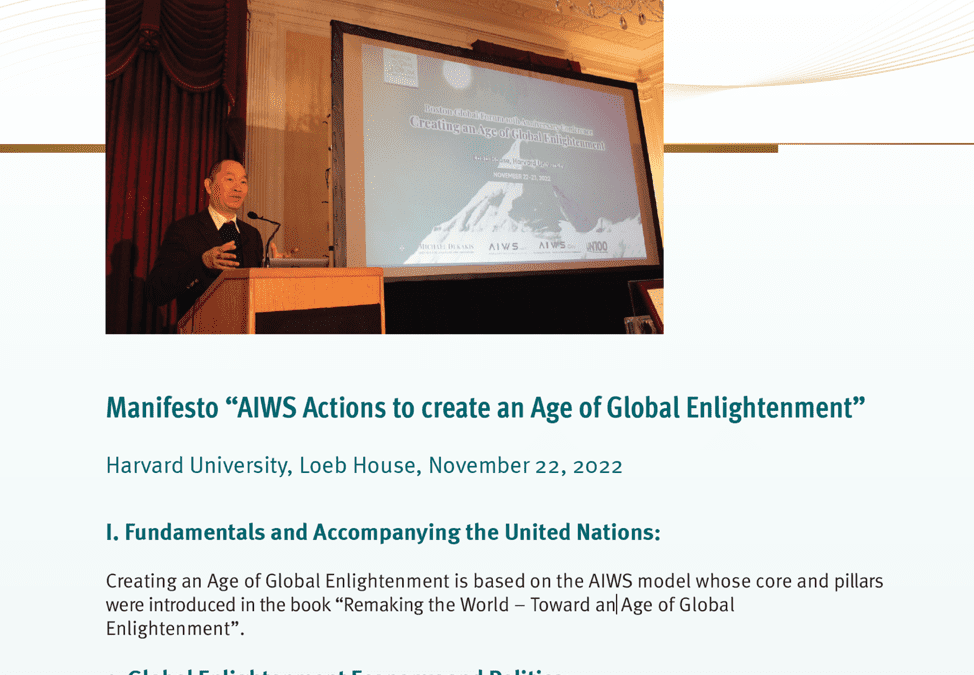
by Editor | Dec 25, 2022 | Global Alliance for Digital Governance
The Manifesto “AIWS Actions to create an Age of Global Enlightenment” was presented and discussed at the BGF 10th Anniversary Conference on November 22, 2022. On behalf of Boston Global Forum leaders, Prime Minister Zlatko Lagumdzija and Nguyen Anh Tuan gave a speech on the Manifesto with the following highlights:
I. Fundamentals and Accompanying the United Nations:
Creating an Age of Global Enlightenment is based on the AIWS model whose core and pillars
were introduced in the book “Remaking the World – Toward an Age of Global
Enlightenment”.
1. Global Enlightenment Economy and Politics:
Every person can be an innovator with foundation standards are Social Contract for the AI Age.
Building a borderless data infrastructure, creating opportunities for all individuals, businesses, and organizations to co-create new values, new products and services that are prosperous, high efficiency, faster, smarter, but protecting the standards and human values of the United Nations, of the Social Contract for the AI Age (SCAI), this is a prerequisite for connecting data infrastructure, commercial transactions and development.
If a country does not meet the standards, it will not be connected. On this data infrastructure, to create an economy where every citizen is an innovator. Creating an education program called the Global Enlightenment Education Program (GEEP) for all individuals. Organizations that commit to respect and apply SCAI standards can participate, and be supported with the GEEP program to know how to build a home of creativity for themselves. Global Alliance for Digital Governance stands out to call, connect, and coordinate between the United Nations, governments of the Pillars: US, Japan, India, and European Alliance (EA), an alliance including the EU, UK, and European countries that accept and apply SCAI standards. These governments have to join a United Nations led AI International Accord, or Global Digital Compact, and then implement it with developing countries.
We call this economy the Global Enlightenment Economy. We call its infrastructure Global Enlightenment Economy Infrastructure (GEEI).
The Global Enlightenment Economy respects and recognizes contributions to society, to drive people and society with a focus not only on material and financial values, but also contribute to creating an Age of Global Enlightenment with peace, security, prosperity for every country, every people, and preventing extreme nationalism in any country. Contributions for this will be recognized as AIWS Rewards.
The Manifesto “AIWS Actions to create an Age of Global Enlightenment” proposes actions and coordination to build Global Enlightenment Economy Infrastructure that enables interoperability across company and national boundaries, and designs Global Enlightenment Economy ecosystems of trusted data and AI that provide safe, secure, and human-centered services for everyone in need: only governments who sign and apply AIIA, Global Digital Compact in their countries, can join the Global Enlightenment Economy Infrastructure.
The Global Alliance for Digital Governance (GADG) will supervise and control implementing standards of SCAI, ensuring data and algorithms are not biased. We call this politics the Global Enlightenment Polity where all individuals can participate in policy deliberations, introduce new ideas. And contribute in all ways to the global wellbeing.
GADG can build an operating mechanism for Global Enlightenment Economy Infrastructure so that companies involved in building and connecting infrastructure cannot create a monopoly, and creates opportunities for start-ups, small and medium-sized enterprises, for each individual, to create an Ecology of the Global Enlightenment Economy. The technology platform is introduced in Alex Sandy Pentland’s article “Building a New Economy: Data, AI, and Web3″
Global Enlightenment Economy Infrastructure supported by the Global Enlightenment Polity and its knowledge platform, the Global System for Sustainable Development (GSSD) can be very instrumental in helping to solve problems of disinformation, misinformation and the like. Then GEEI and GSSD will be good and solid platforms for politics and society of the Global Enlightenment Age – AIWS
Read the full manifesto here.
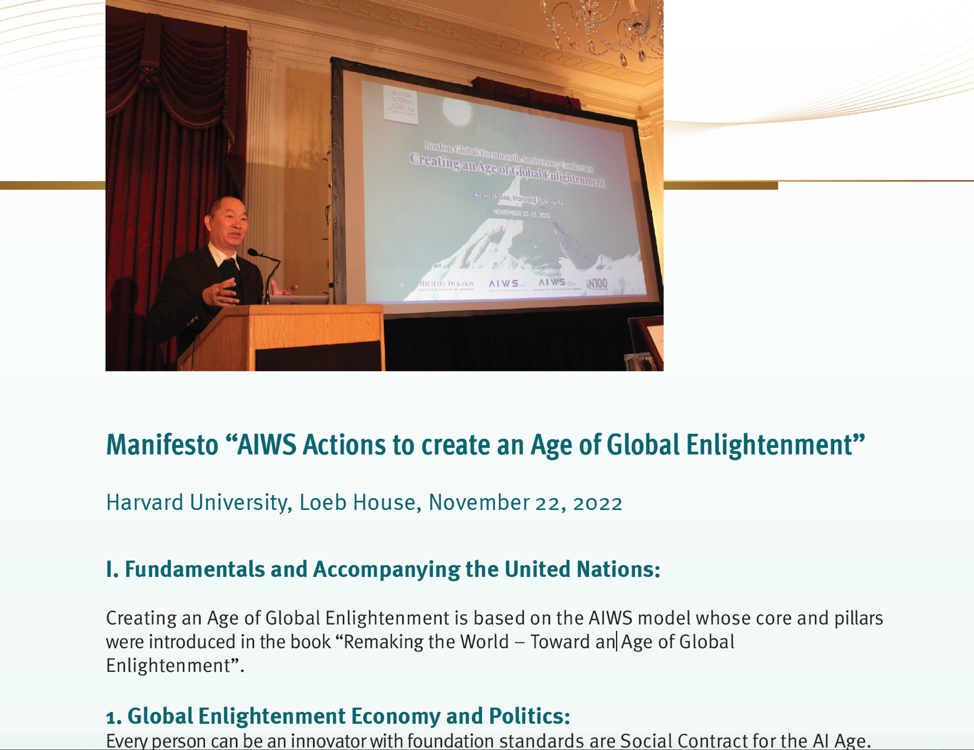
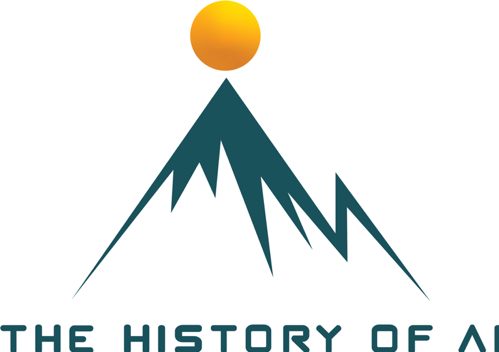
by Editor | Dec 25, 2022 | News
OpenAI and its co-founder and chief scientist Ilya Sutskeever are nominated for the HAI 2022 Award due to the organization’s work in DALL-E 2 and ChatGPT.
OpenAI is an AI research lab, with a mission statement of “promoting and developing friendly AI in a way that benefits humanity as a whole.” The project was founded in 2015 by individuals and groups such as Sam Altman, Elon Musk, AWS, and Y Combinator, who invested over $1 billion into the venture.
DALL-E 2 is a deep learning model that generates images and drawings through user prompts. ChatGPT is an AI chatbot that was launched in late November 2022. Users can ask questions or prompts, and ChatGPT could respond in kind, similar to what a human would answer.
There are concerns with DALL-E 2, and other AI art generators broadly, on copyright infringements. As these models study works done by artists, many see it as not being fairly compensated for their efforts. On the other program, ChatGPT’s flaws include some issues with answers to questions, with some accuracy. Some also have fears about it in education, that students may be able to spoof actual writing with whatever ChatGPT spit out.
Policies that could potentially combat these issues in OpenAI’s programs include oversight or guidance to be beneficial to mankind, moving them away from sensitive or social-manipulating arenas. To this end, it should be ensured that DALL-E and ChatGPT would follow BGF guidelines and the fundamental rights and ethics.

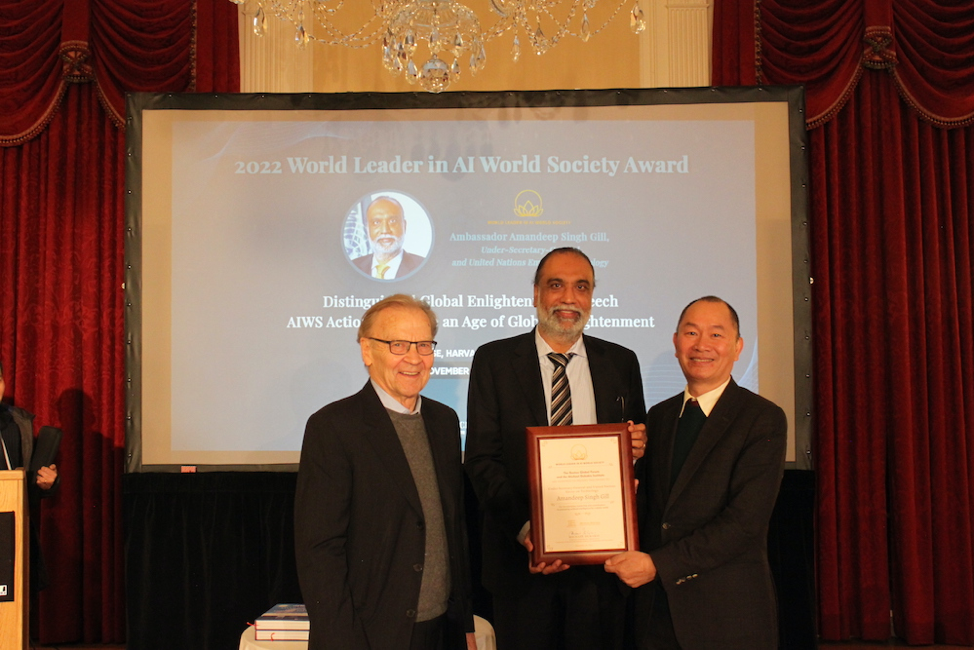
by Editor | Dec 18, 2022 | News
Harvard University Loeb House, November 22-23, 2022

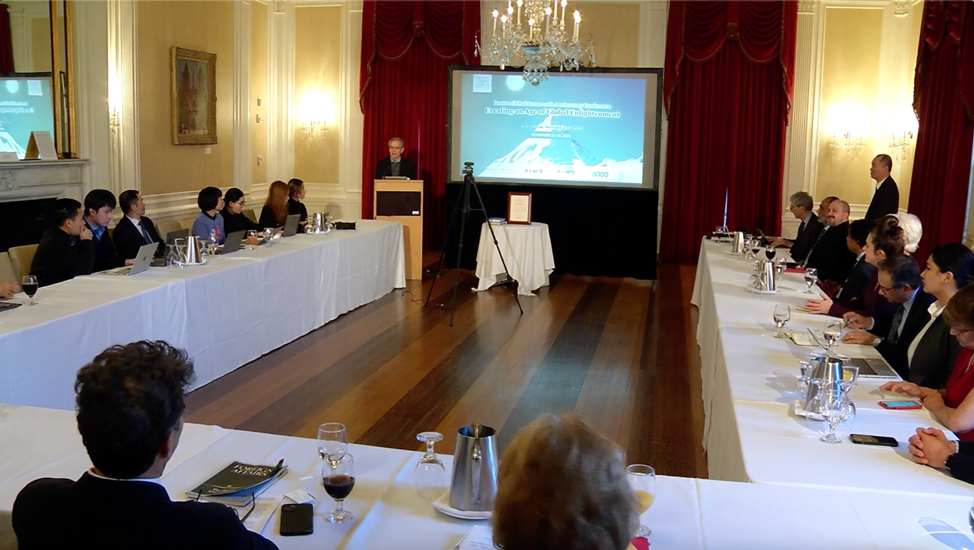
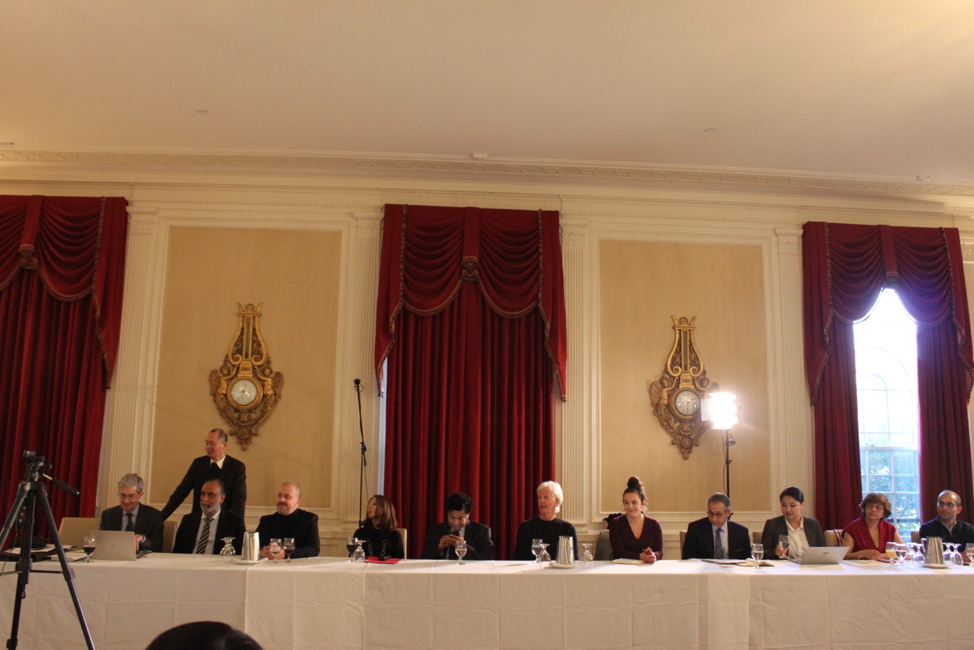

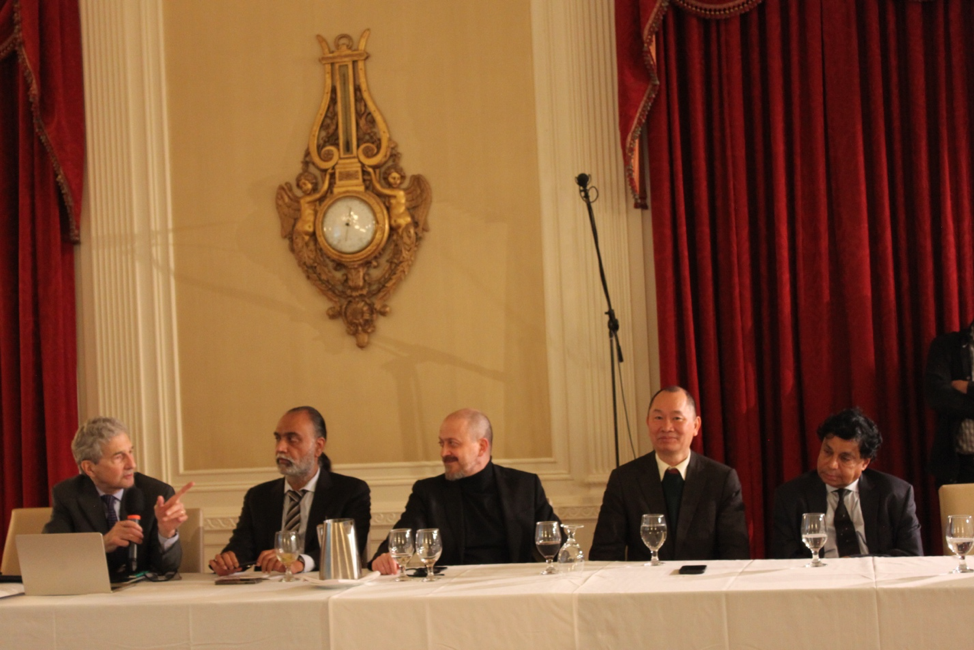
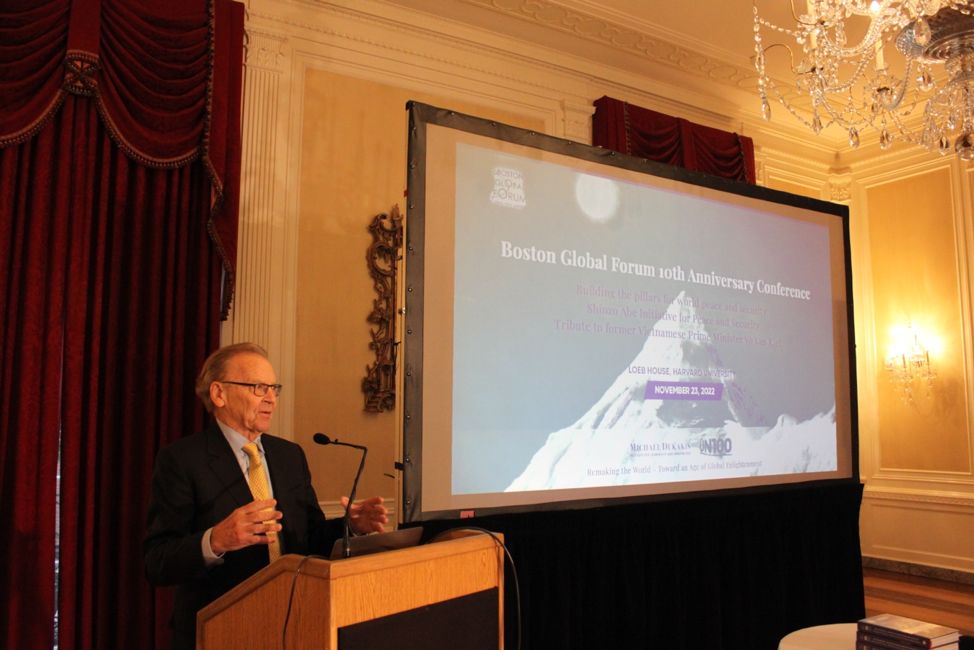
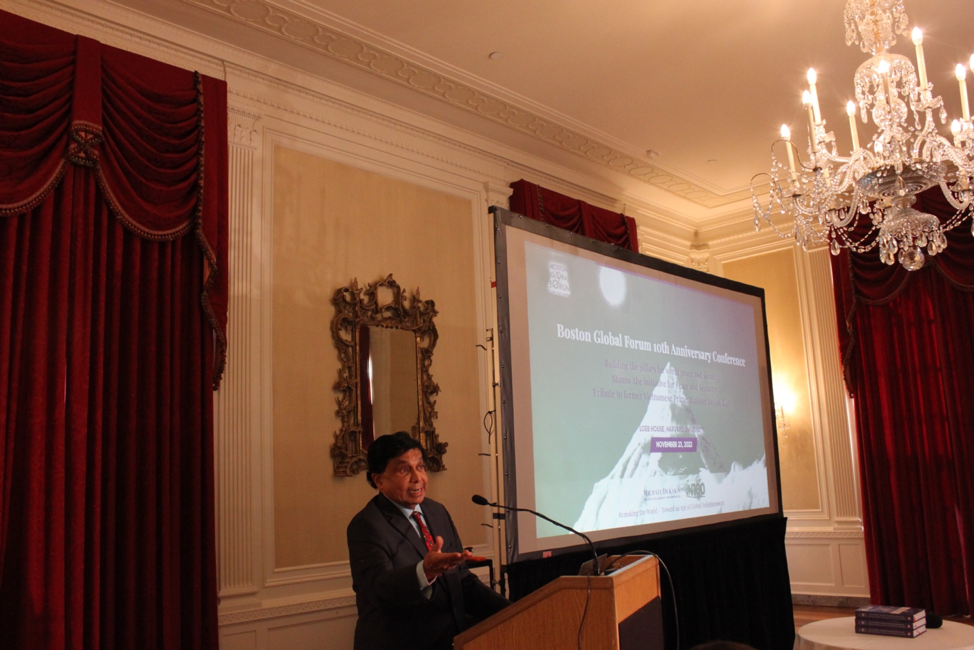
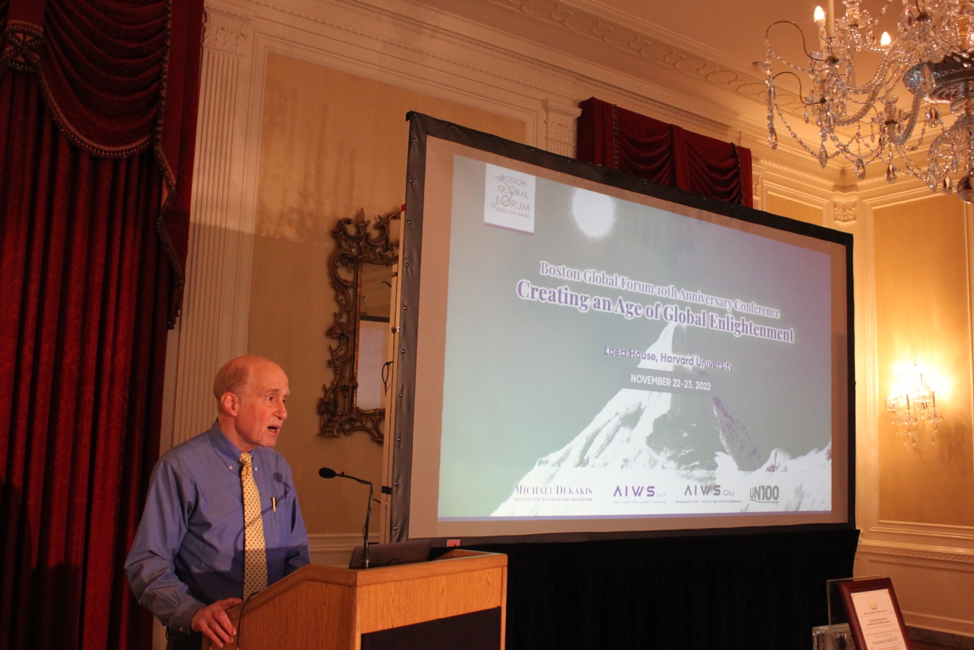
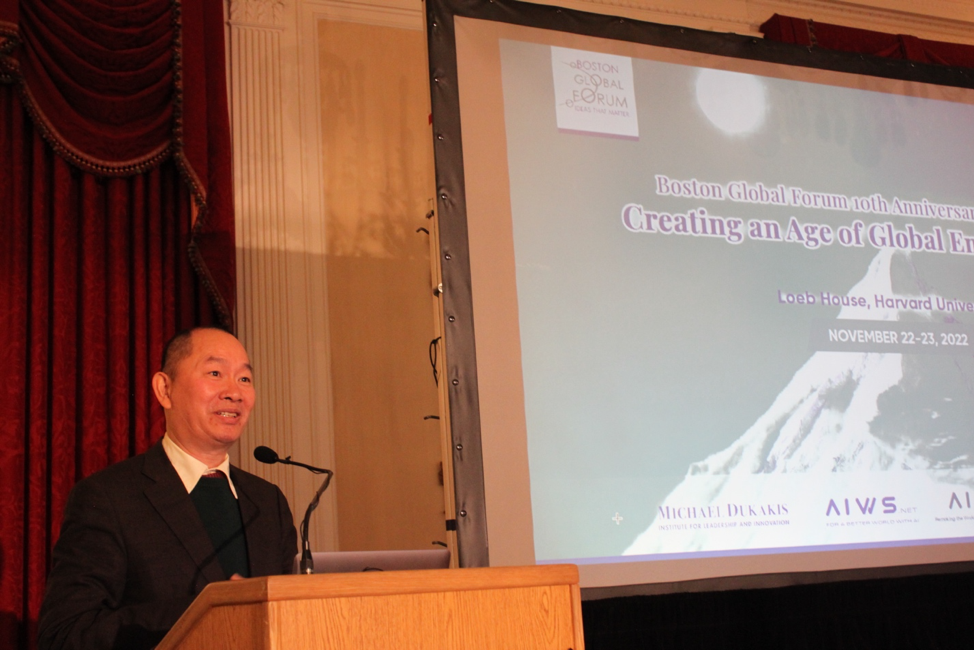

by Editor | Dec 18, 2022 | News
On December 12, 2022, Boston Global Forum officially published the ebook “World Leader in AIWS Award 2022 and Manifesto ‘AIWS Actions to create an Age of Global Enlightenment’”. Please download Ebook – AIWS Award 2022





















